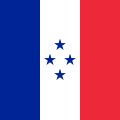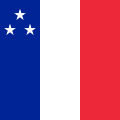User:JMvanDijk/Sandbox 9/Box 26
Coat of Arms of France
[edit]| Unofficial coat of arms of France | |
|---|---|
 | |
| Versions | |
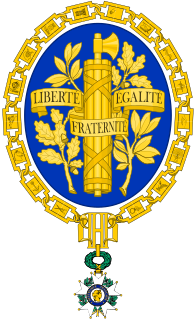 | |
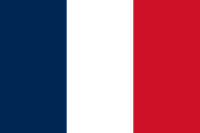 Not a coat of arms, but the Tricolor, the Flag of France is the most known symbol | |
| Armiger | French Republic |
| Adopted | 1905[3] |
| Crest | Wreath |
| Shield | Azure, a lictor's fasces palewise upon two branches, of oak and of laurel, crossed in saltire, all or, surmounted by a ribbon of the same charged with the motto in letters sable: "LIBERTÉ, ÉGALITÉ, FRATERNITÉ" |
| Order(s) | Star and grand collar of the Legion of Honour (current version since 1953) |
| Earlier version(s) | See history |
The coat of arms of France is an unofficial emblem of the French Republic. It depicts a lictor's fasces upon branches of laurel and oak, as well as a ribbon bearing the national motto of Liberté, égalité, fraternité. The full achievement includes the star and grand collar of the Legion of Honour. This composition was created in 1905 (during the Third Republic) by heraldic painter-engraver Maurice de Meyère,[4] and it has been used at the Foreign Ministry during state visits and for presidential inaugurations.
The country is traditionally associated with the fleurs-de-lis design, which came into use by French kings during the High Middle Ages. This design still represents France and the House of Bourbon in the form of marshalling, such as in the arms of Spain, Quebec, and Canada. The fleur-de-lis was also the symbol of Île-de-France, the core of the French kingdom, and the arms of many French communes (see [Category:Coats of arms of communes of France by department].
The only national symbol specified in the present constitution is the tricolour flag in Article 2.[5]
Devices
[edit]Azure, a lictor's fasces palewise upon two branches, of oak and of laurel, crossed in saltire, all or, surmounted by a ribbon of the same charged with the motto in letters sable: "LIBERTÉ, ÉGALITÉ, FRATERNITÉ". The shield is surrounded by the Grand Collar of the Order of the Legion of Honor proper, the cross suspended from it in base.
Coat of arms: charges
[edit]Motto
[edit]Liberté, égalité, fraternité (French pronunciation: [libɛʁte eɡalite fʁatɛʁnite]; "liberty, equality, fraternity",[7] is the national motto of France, and is an example of a tripartite motto. Although it finds its origins in the French Revolution, it was then only one motto among others and was not institutionalized until the Third Republic at the end of the 19th century.[8]
Fasces
[edit]Fasces are a bundle of birch rods containing a sacrificial axe. In Roman times, the fasces symbolized the power of magistrates, representing union and accord with the Roman Republic. French architects began to use the Roman fasces (faisceaux romains) as a decorative device during the reign of Louis XIII (1610–1643),[9][10] and the imagery of the French Revolution used references to the ancient Roman Republic to an even greater extent. During the First Republic, topped by the Phrygian cap, the fasces is a tribute to the Roman Republic and means that power belongs to the people. It also symbolizes the "unity and indivisibility of the Republic",[11] as stated in the French Constitution.
Branches
[edit]Coat of arms of France/French Republic
[edit]- The oak is France's national tree, and a common symbol of strength and endurance.[12]
- A bay laurel (Laurus nobilis) branch, an aromatic broadleaf evergreen, or later from spineless butcher's broom (Ruscus hypoglossum) or cherry laurel (Prunus laurocerasus). It is a symbol of triumph, which traces back to Greek mythology. Apollo is represented wearing a laurel wreath on his head, and wreaths were awarded to victors in athletic competitions, including the ancient Olympics — for which they were made of wild olive-tree known as "kotinos" (κότινος),[13] (sc. at Olympia)—and in poetic meets. In Rome they were symbols of martial victory, crowning a successful commander during his triumph.
External devices
[edit]- Star and grand collar of the Legion of Honour, which is the highest French order of merit for military and civil merits, established in 1802 by Napoleon Bonaparte and retained by all later French governments and régimes. The achievement includes the order's grand collar, which is worn only by the President, as Grand Master of the order.
Tricolore with the Republican Emblem
[edit]

Free French Forces 1940-1944
[edit]
Fifth Republic
[edit]
Timeline diagram
[edit]Version of Tricolore incorpating the Bourbon Version of the Fleur-de-lis
[edit]














Officers of the Republic
[edit]-
Flag of the Ministre des Armées
-
Admiral of the French Navy
-
Vice-Admiral D'escadre of the French Navy
-
Vice-Admiral of the French Navy
-
Contre-Admiral of the French Navy
-
Capitaine de Vaisseau of the French Navy (Division).svg
-
Capitaine de Vaisseau of the French Navy (Unit) & Harbour Commanding Officer

| Legion of Honour ribbons | ||||
|---|---|---|---|---|
- ^ "FranFrance". Archived from the original on 2018-07-05.
- ^ "Réception d'Emmanuel Macron à l'Hôtel de ville de Paris". 18 May 2017. Archived from the original on 22 March 2019. Retrieved 25 February 2019.
- ^ "Les symboles de la République française". Site de la présidence de la République. 21 October 2015.
- ^ https://gallica.bnf.fr/ark:/12148/bpt6k4657709x/f1.item.r=%22%20D'azur,%20au%20faisceau%20de%20licteur%20posé%20en%20pal%22.zoom
- ^ Article II of the Constitution of France (1958)
- ^ "France: Symbols of the Republic".
- ^ "Liberty, Égalité, Fraternité". Embassy of France in the US. Archived from the original on 18 October 2014. Retrieved 18 September 2014.
- ^ Ozouf, Mona (1997), "Liberté, égalité, fraternité stands for peace country and war", in Nora, Pierre (ed.), Lieux de Mémoire [Places of memory] (in French), vol. tome III, Quarto Gallimard, pp. 4353–89 (abridged translation, Realms of Memory, Columbia University Press, 1996–98).
- ^ Les Grands Palais de France : Fontainebleau, I re Série, Styles Louis XV, Louis XVI, Empire, Labrairie Centrale D'Art Et D'Architecture, Ancienne Maison Morel, Ch. Eggimann, Succ, 106, Boulevard Saint Germain, Paris, 1910
- ^ Les Grands Palais de France : Fontainebleau , II me Série, Les Appartments D'Anne D'Autriche, De François I er, Et D'Elenonre La Chapelle, Labrairie Centrale D'Art Et D'Architecture, Ancienne Maison Morel, Ch. Eggimann, Succ, 106, Boulevard Saint Germain, Paris, 1912
- ^ "The lictor's fasces". 20 November 2012.
- ^ "Oak as a Symbol". Venables Oak. Archived from the original on 5 May 2013. Retrieved 26 September 2012.
- ^ Liddell, Henry George; Scott, Robert (1843). A Greek-English Lexicon (1 ed.). Oxford: Oxford University Press. ISBN 978-0-19-864226-8. Retrieved 13 February 2019.
κότι^νος


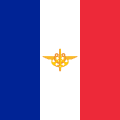
![Chef d'État-Major des Armées [CEMA]](http://upload.wikimedia.org/wikipedia/commons/thumb/f/fa/Marque_CEMA.svg/120px-Marque_CEMA.svg.png)





